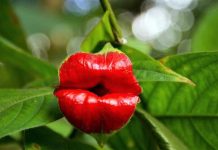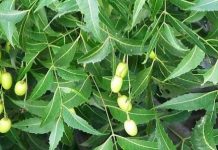Scientific name: Cascabela thevetia (L.) Lippold
Family: Apocynaceae
Synonym: Thevetia peruviana (Pers.) K.Schum.
Bengali/Vernacular name: Kolkephul, Holde kolkephul.
Tribal name: Goi phul (Chakma), Kaduk chapaing (Chak), Sakho-kazzeye (Khumi), Cherry-pawn (Rakhaing), Koilabi-khlom (Tripura).
English name: Yellow oleander, Lucky nut, Mexican oleander.
Description of the plant: A large shrub or small tree. Leaves 8-15 cm long, linear, narrowed at both ends, spirally arranged. Cymes few-flowered, terminal, peduncle very short; flowers yellow or orange, occasionally white, funnel-shaped, 5 cm long. The fruit is a drupe, smooth, green, shining, somewhat hard, rounded, and angled, 3-4 cm in diameter.

Plant parts used: Leaf.
Ethnomedicinal uses: The leaf paste is applied on the forehead for relief of children’s ailments.
A fresh juice is extracted from the leaves of the plant is applied into the infected eye twice a day (one or two drops each time) for three days to treat conjunctivitis.
Leaf boiled water is used to wash biting place for the treatment of insect bite.
Paste prepared from the leaves of the plant is applied on the infected skin to treat leprosy.
A paste is made with the leaves of the plant is applied on the affected part of the body to treat body pain and inflammation.
Distribution: The species commonly occurs throughout the country.
Is this plant misidentified? If yes, please tell us….















… [Trackback]
[…] Info to that Topic: natureinfo.com.bd/cascabela-thevetia/ […]